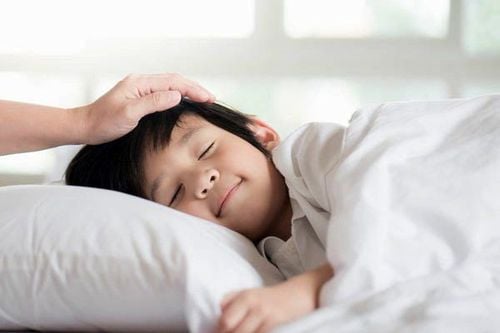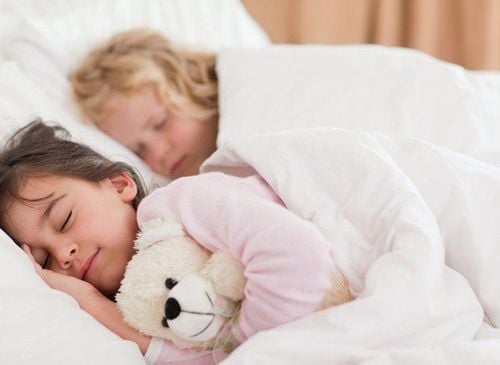This is an automatically translated article.
According to experts, parents should practice letting children sleep on their own when they are 3 years old. However, the decision to let your baby sleep separately depends on the health and psychology of the child, as well as your circumstances and feelings when you have to sleep separately from your baby.
1. Benefits of training children to sleep separately
According to statistics, only about 6% of children in the West sleep with their parents, in Japan it is 26%, but in Vietnam, this percentage accounts for the majority. Even, there are many families who still sleep with their children even though they have entered elementary and middle school.
The concept in our country is that children are still small and need to be close to their parents to love, take care of and not stay away from me. But in fact, the longer a baby sleeps with its parents, the more negative effects it has. In a recent UK study, almost two-thirds of sudden infant deaths occurred while co-sleeping with their mothers. Although the exact cause is not known, it is most likely due to the baby being suffocated by adults and blankets, causing suffocation.
Experts say that training children to sleep separately not only helps parents get a deeper sleep, but also benefits the development of their children. Children who are allowed to sleep separately early will form an independent personality from a young age, increase their confidence, not depend on and rely on their parents when entering school age.
According to many studies, children aged 3 years and older should not share a bed with their parents. Because at this time, the child has the ability to recognize gender, easily affected by psycho-emotional. Not sleeping in the same room with children also ensures privacy for parents and maintains family happiness.

Cho trẻ ngủ riêng giúp đem lại nhiều lợi ích cho bản thân trẻ từ khi còn nhỏ
2. How to put your baby to sleep separately in stages
2.1. Stage 1: Co-sleeping with your baby During the first few weeks, keeping your baby in the same room as you will make it easier for you to get used to the baby's sleeping patterns and breathing sounds, as well as recognize the cues of when your baby is hungry. Experts say that babies should sleep in their mother's lap for the first 3 weeks of life, to ensure a comprehensive and healthy development.
2.2. Stage 2: Put your baby to sleep in a separate crib right next to you. when the child is 1 year old. Research shows that infants have a lower risk of sudden death from SIDS when lying on their backs on a firm mattress and sleeping in the same room as their parents. Remember to put the crib in a safe place, within your control. Don't forget to check your baby's sleep in the middle of the night to make sure he's sleeping well and that nothing has happened.
2.3. Stage 3: Separation between the child's sleeping place and the parent's When the child is older, it is recommended to erect a wall or curtain in the common room to create a sense of separate space. You also need to pay attention to the arrangement of your child's sleeping area, which is eye-catching, appropriate, and safe. Do not forget to teach your child the principles of respecting privacy, such as "everyone goes to their own place" at bedtime, do not arbitrarily infringe... Parents need to set an example for their children, if they want to visit their children, they should also ask prior permission, similar to knocking on the door. Note, sharing a room with a bed is only a transitional step, not a long-term solution because children can still nag, so they don't have independence. On the other hand, children who share the same space with their parents can still witness undesirable images.
2.4. Stage 4: Encourage your child to sleep in a separate room First of all, it is necessary to explain to the child that he is an adult and needs his own room to freely play and study without being disturbed by anyone, and so are parents. For children to enjoy being on their own, it is necessary to prepare a lovely bedroom next to the parents' room, if the child is older, they can participate in decorating according to their own preferences, can put teddy bears, dolls or favorite toys on the bed. together...
Mom can stay here to live and play with the baby, then pat her to sleep to create a sense of familiarity with the room, reducing anxiety. Tell children that parents are right next to them, if there is an important problem, they can call their mother. In the first few days, the baby will wake up because of fear and loneliness, but gradually will get used to it. Mother must not be soft-hearted to sleep with the child or let the child go to her room, it will be difficult to decide later. If the child has agreed to sleep separately, the commitment must be honored and followed properly.

Cha mẹ nên động viên con ngủ ở phòng riêng
3. When should your child not sleep separately?
The baby's health is not good If the child is born with weak health or has some dangerous diseases, it is necessary to take comprehensive care of the parents, follow the doctor's orders and should not exercise Children sleep alone too early. If you want, first of all, parents must consult a doctor about how to safely put their baby to sleep separately, in accordance with the health conditions of the child.
Children's psychology is not ready Many parents try to force their children to sleep separately because they have just got a new house, listen to their friends and colleagues' advice,... While their children are used to sleeping with their parents, sudden decisions like So it is easy for the child to be stubborn, refuse to obey, or the child will feel rejected, abandoned and emotionally hurt by his parents. You yourself will also be tired, helpless and difficult to persevere in training your baby to sleep separately. Therefore, parents must prepare mentally for their children, follow them step by step, and explain to their children why they have to sleep separately before and during the implementation.
Do not have a suitable separate room. It is advisable to avoid letting the baby sleep separately early when not equipped with adequate conditions, not ensuring a really comfortable and safe space for children to sleep.
When a new baby is about to be born If having to sleep separately at this stage, it is easy for children to misunderstand that they have been "outlined", abandoned or occupied by the baby. This can be deeply hurtful, in addition to feelings of self-pity and suffering, the child may even develop jealousy and hatred for the baby. Therefore, you must be very delicate, explaining to your child that sleeping separately is for his own benefit. It is important to show your child that your parents still love and care for you like before. Convincing: "The baby will cry all night, making it difficult for me to sleep / The baby often wetting and pooping, making the room not as fragrant and clean as my room...".

Khi sức khỏe của trẻ không tốt, cha mẹ không nên cho con ngủ riêng
In short, learning to let children sleep separately from parents is a good thing to do, but when and how to put children to sleep separately for each family case is very different. Therefore, parents must flexibly decide for their children to sleep separately when it is most appropriate, to avoid unfortunate things that may happen.
To prevent diseases that babies often get, parents should pay attention to nutrition to improve children's resistance. At the same time, add supporting foods containing lysine, essential micro-minerals and vitamins such as zinc, chromium, selenium, B vitamins,... snacks and less digestive problems.
Parents can learn more:
Why do you need to supplement Lysine for your baby?
The role of zinc - Guidelines for reasonable zinc supplementation
Please visit the website Vinmec.com regularly and update useful information to take care of your baby and family.
Reference source: babycenter.com













